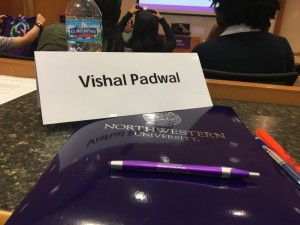Hello,你好, hola, hallo! We are already into our second term (Fall 2) and time is flying. First things first, I want to take a moment to reflect on the infamous first week of law school: orientation week.
Orientation week was not just a week full of fun, free food, and tons of Northwestern swag, although there was a lot of all of that; it also functioned as an introduction to the MSL community, graduate school logistics, and, most importantly, the legal concepts and foundations that underpin our MSL study.
A strong orientation is vital for the MSL program because the student body consists of scientists, mathematicians, engineers and various STEM majors. Most of us are not trained to interpret law, but orientation week helped with the transition to law by training us for the courses to come.
 During Orientation Week, Professor Susan Provenzano, a member of the Law faculty and one of our MSL teachers, gave us a brief introduction to a few Employment Law topics, mainly involving duties towards employers or a company, such as the duty of loyalty and fiduciary duties. A lot of the cases and materials we read involved situations where an employee leaves a company and starts a new endeavor, and the questions we looked at involved who owns the employee’s ideas and whether the employee was being disloyal to the former employer. One case we looked at was the case involving Barbie and Bratz dolls – an employee of Mattel (Barbie) came up with the idea for the Bratz dolls, and sold the idea to the MGA company. Mattel claimed that the former employee had breached his duty of loyalty to Mattel. We discussed all of the concepts involved and even got to see JD student “actors” act out the different parts of the scenario – a witness interview, a deposition, a court hearing, etc.
During Orientation Week, Professor Susan Provenzano, a member of the Law faculty and one of our MSL teachers, gave us a brief introduction to a few Employment Law topics, mainly involving duties towards employers or a company, such as the duty of loyalty and fiduciary duties. A lot of the cases and materials we read involved situations where an employee leaves a company and starts a new endeavor, and the questions we looked at involved who owns the employee’s ideas and whether the employee was being disloyal to the former employer. One case we looked at was the case involving Barbie and Bratz dolls – an employee of Mattel (Barbie) came up with the idea for the Bratz dolls, and sold the idea to the MGA company. Mattel claimed that the former employee had breached his duty of loyalty to Mattel. We discussed all of the concepts involved and even got to see JD student “actors” act out the different parts of the scenario – a witness interview, a deposition, a court hearing, etc.
The goal of all of this wasn’t really to learn about employment law (although we did learn some interesting things), but was more focused on understanding the legal process and learning to read and understand cases – this was probably the greatest take away from orientation. We also focused on how to take ideas from a case and use them to predict what would happen in a new factual scenario – this is called applying law to facts.
MSL students are law students, and as such, it is expected that we know how to read, comprehend, remember, and flesh out the law involved in a plethora of cases. Once classes started, we saw the true value of this skill: we read between 2-6 cases per class, and so learning how to understand and digest cases at orientation was our savior when we began to read and discuss cases for our regular classes.
Now that I have completed the first MSL term (Fall 1), I appreciate the coursework and lectures of orientation even more. The concepts we discussed during orientation gave us a flavour of what the coursework during the rest of the year was going to be like in both quality and quantity.
During orientation week, we also had the opportunity to get to know our peers: 42 incoming full-time students and 18 incoming part-time students. The MSL program preaches the benefits of team projects and group work, because most of the students end up in team-based environments after earning their MSL. Getting to know our peers during orientation gave us a better handle on the plethora of group projects that would come in our fall classes (and will continue throughout the program).
Orientation also prepared us for the logistics of grad school. We’ll go into the logistics in detail in later posts, but overall, we discussed class scheduling, course descriptions, important deadlines, and school policies. Since all incoming full-time students take the same classes in the Fall 1 term, we registered for our first courses together during orientation.
Vishal
